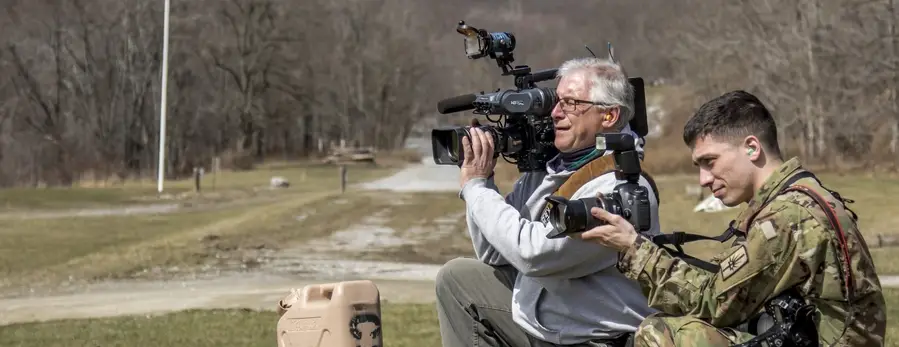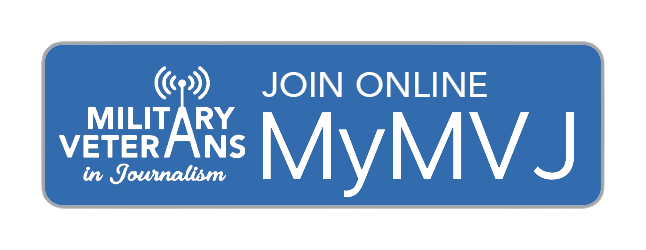Before there was the Military Veterans in Journalism nonprofit organization, there was a small group of journalists who provided informal mentorship to transitioning veterans. All the work we do now, from our fellowships and job postings to our advocacy and media partnerships, was built off this simple idea that mentorship was useful for veterans.

Justin Meacock, pictured above, is an MVJ protégé who was recently accepted to CUNY’s Craig Newmark Graduate School of Journalism.
But this cornerstone of the MVJ culture – the softening of the divide between civilian newsrooms and veterans in journalism – was quite an amateur operation until MVJ received a $50,000 grant from the Hollywood Foreign Press Association to be disbursed over five years. With the $10,000 we received about one year ago, MVJ has improved the process of pairing military veterans with seasoned journalists, supporting the career growth of veterans who work in news media while directly and indirectly improving newsroom diversity. We have also formalized, professionalized, and automated our mentorship program to ensure its consistency and reliability for mentors and protégés alike.
The first step in the improvement process was to develop a prototype for mentorship software. Our goal was to create a program that would automate connections between MVJ’s mentors and mentees while helping our team better track mentorship experiences. This initial prototype was the first version of MyMVJ, built on a CRM platform called Salesforce. MyMVJ has since developed into the member connection app and site we have today.

Roughly 26% of the protégés in MVJ’s mentorship program identify as female, which is an excellent rate of gender equity compared to the veteran community at large.
Since MVJ is a young nonprofit, our team prototypes processes immediately, then collects feedback from users to test and improve. During the test period from July to October 2021, we saw mentorship requests decline, with only eight mentorship connections occurring. Our team studied the drop-off and found users struggled to connect with mentors. The prototype process was too automated, as user feedback indicated professional journalists do not respond well to automated emails.
In September 2021, we identified a list of problems arising from MyMVJ and used it to overhaul the process. We designed standard operating procedures that were more automated than our original program but offered journalists who volunteered for the mentorship program more personalized communication approaches.
In October 2021, MVJ created our second prototype of the mentorship program using third-party software called Mentornity. This new software allowed the program administrator greater control over mentorship interactions. We introduced the new process on Oct. 21, collected users (both mentors and protégés), and tested the program for the remainder of the last quarter of the year. The new system was fully implemented by January 2022. In addition to Mentornity, we built a manually controlled backend of the mentorship software, which has allowed us to keep excellent track of mentorships with fewer working hours for our team.

MVJ’s mentorship program displays more than double the amount of diversity that’s industry standard for newsroom staff.
The program’s popularity and success skyrocketed from there. Since the beginning of the first quarter of 2022, we have established 25 mentorship connections – the most our program has ever facilitated at once. Of these connections, 41 percent have been persons of color, which is more than double the industry standard for persons of color on newsroom staff. More than 25 percent of our protégés have been women, which is an excellent rate of gender equity among the veteran community, where only 10 percent of veterans are women.
MVJ’s new process also allows us to track the goals of our protégés to determine how well the mentorships have satisfied their objectives from the beginning of their time in the program. This has added great value to MVJ’s mentorship program. Protégés are now asked to take a post-mentorship survey, which our team analyzes to prioritize new mentor assignments based on the goals they have left to achieve. On average, MVJ’s protégés meet more than 70 percent of their goals from their first mentorship session, and 2 out of the 25 mentorships assigned in the first quarter have resulted in MVJ members getting hired thanks to their new connection.
We hope to see the mentorship program continue this expansion in the future, and we believe it has proven its worth for veterans in need of a mentor. If you are seeking to mentor a military veteran journalist or are a veteran journalist looking for guidance, sign up for MVJ’s mentorship program today via the link below.






